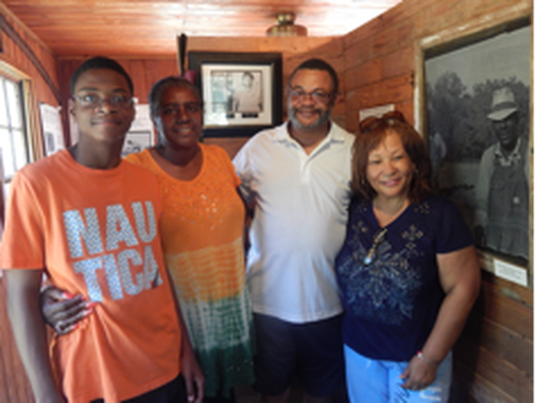Tillery, NC – The Remembering Tillery History House Museum was located on Unit #28 of the Tillery Farms New Deal Resettlement of the 1930’s and owned by Lewis and Glendora Thomas until they moved to Washington, DC in the mid 1950’s. The house, located on Highway 561, was moved to the Tillery Community Center in 2002 and rehabilitated in 2003 to house the museum by the Concerned Citizens of Tillery (CCT). On Friday, July 31, 2015 a phone call came to the office of the CCT and Gary R. Grant, CCT’s CEO heard the voice at the other end state, “I am the granddaughter of Lewis and Glendora Thomas and other family members and I are here at the Remembering Tillery History House.” Well, now for sure Grant was knocked off his feet. He informed her that he would be right over. Arriving at the Tillery Community Center Campus, there stood Avis Bachman-Dowel, the first grandchild born to the Thomas’ in the New Deal Tillery Resettlement Farm when the family lived here. With her were her brother Robert Kornegay, his wife Karen and their son Robert, Jr. They were all very excited to see the house where their grandparents once lived.
The Remembering Tillery History Museum houses the history of the Tillery Resettlement Community and the continued work of the Concerned Citizens of Tillery for justice and equality.. A class from the Duke University Center for Documentary Studies worked with CCT to have the museum ready and made of interests for the 25th Anniversary Celebration.
The Tillery Resettlement Farms was one of approximately 113 rural resettlement experiments conducted by the U. S. government under President Roosevelt’s New Deal. The Tillery Resettlement Farms, later know as the Roanoke Farms, was the largest land mass for the resettlement program, consisting of some 18,000 acres for both Black and White former sharecroppers.
CCT, established in 1978, has evolved into a model community-based organization whose purpose is to promote and improve the social, economic, and educational welfare of the citizens of the area and the state. CCT has been a leader in the struggle for awakening and affirming African American culture and heritage and the recognition of the contributions of those who came to settle on the Tillery Farms. For more information on the Tillery farms project go to www.cct78.org or contact the CCT office at 252-826-3017. One can also e-mail [email protected].
The Remembering Tillery History Museum houses the history of the Tillery Resettlement Community and the continued work of the Concerned Citizens of Tillery for justice and equality.. A class from the Duke University Center for Documentary Studies worked with CCT to have the museum ready and made of interests for the 25th Anniversary Celebration.
The Tillery Resettlement Farms was one of approximately 113 rural resettlement experiments conducted by the U. S. government under President Roosevelt’s New Deal. The Tillery Resettlement Farms, later know as the Roanoke Farms, was the largest land mass for the resettlement program, consisting of some 18,000 acres for both Black and White former sharecroppers.
CCT, established in 1978, has evolved into a model community-based organization whose purpose is to promote and improve the social, economic, and educational welfare of the citizens of the area and the state. CCT has been a leader in the struggle for awakening and affirming African American culture and heritage and the recognition of the contributions of those who came to settle on the Tillery Farms. For more information on the Tillery farms project go to www.cct78.org or contact the CCT office at 252-826-3017. One can also e-mail [email protected].

Pictured (L-R) are decedents of Lewis and Glendora Thomas who purchased Unit #28 of the New Deal Resettlement Tillery Farms on March 1, 1947: Thomas’ great-grandson Robert, Jr., granddaughter-in-law Karen, grandson Robert Korneygay and granddaughter Avis Bachman-Dewel, who constantly reminded all of us that “I am the only grandchild born in this house!” Photo of Lewis and Glendora Thomas is seen in the background.
 RSS Feed
RSS Feed
